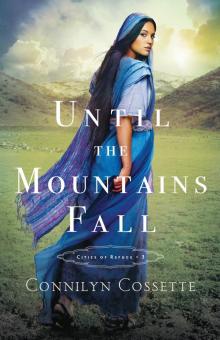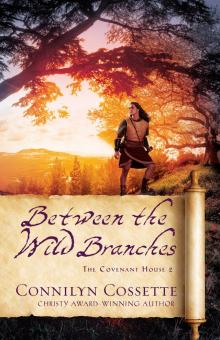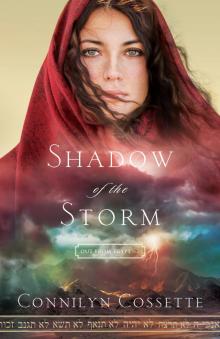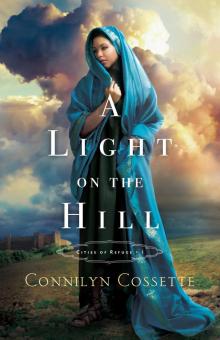- Home
- Connilyn Cossette
Wings of the Wind Page 4
Wings of the Wind Read online
Page 4
I sighed and nodded my head.
Shira slapped her hands together. “Wonderful. I will go find the elders.”
“Now?” My pulse sped.
“It’s important that you do it quickly, before anyone else sees you.” She brushed my hair back from my face. “Besides, I have you all prepared. You look lovely.”
My breath snagged in my throat. Shira had been preparing me for my wedding?
I stammered, “But—but isn’t there a betrothal period?”
She smiled, but it did not touch her eyes. “Not in these cases. As a captive, you will be married at once, to protect you. There is no dowry or bride-price and certainly no home to prepare since we are still on the journey to our new land.”
I raised my brows.
“You must perform certain mitzvot, certain instructions, but you are also given protections. The Torah, the law given to Mosheh, our leader, ensures you will be given a full cycle of the moon to mourn your loved ones before consummation of the marriage.”
I already had a month to mourn. The wounds on my wrist were healing, no longer tender from the copper blade I’d used to etch the four permanent reminders of grief into my skin.
Tobiah cleared his throat, suddenly quite interested in his dusty sandals. Was he blushing? Surely not. Did he not have experience with women? He must be well over twenty. Why had he not married before now?
Shira threw me a reassuring glance and a tremulous smile before flitting out of the tent with a promise to return quickly with the elders to perform a marriage ceremony.
Once again, uneasy silence reigned inside my black woolen prison. Of course I could attempt to run, but I would not make it far; after Shira’s warning that I would be violated by other men in the camp, I could not chance it.
Perhaps if I truly would be given a month to mourn my family, I could find a way to escape. Tobiah could not watch me at every moment, could he? I sat down on the stool Shira had vacated, stifling a whimper at the spike of pain in my shoulder. Running would have to wait until I healed more.
Tobiah stood by the entrance, shifting his weight from foot to foot, large arms crossed and eyes anywhere but on me. I studied my soon-to-be husband. A soldier from head to foot and built like a bear, Tobiah would no doubt be intimidating on the battlefield; although, scanning his bare arms and neck, I saw no markings outlining his battle prowess. What sort of warrior did not display his victories on his skin?
His refusal to meet my eye and his limited answers to my questions annoyed me. Why would he even consider marrying his enemy? He had made no advances upon me, at least since I was conscious, but a month was a long time.
Tension hummed and buzzed in the air. The tent seemed to be closing in on us, and if Shira did not return soon, I might scream. I closed my eyes, trying to steady the rhythm of my heart, breathing slowly and thinking of my father.
He had done his best to persuade me to marry. Even ordered me to do so a time or two. But I refused every suitor he brought before me. I had no interest in playing the part of the dutiful wife to some lecher. And I made it so known to my father.
He blustered, he threatened, but ultimately I won. As much as he ignored his one daughter, he seemed almost relieved at my many adamant refusals over the years. Both Ashrath and Petubah, the wives he took after my mother abandoned us, complained unceasingly about having to feed me as well as Davash, my only unmarried brother. My father told them to keep their tongues in their heads and do their work.
When my cousin refused to provide even one copper deben to secure me a husband after he had inherited the responsibility of my welfare, I had been glad, until I realized that my only option for survival was prostitution. It hadn’t taken much to decide to run off to battle rather than submit to such degradation.
And here I sat, ready to marry a man I did not know. A man who was my enemy. I should be exacting revenge on this Hebrew, not marrying him. My brothers’ curses howled at me from beyond the grave. Perhaps while I escaped, I could slit the Hebrew’s throat as he slept, to silence their cries in my head.
Shira’s voice beckoned Tobiah and me outside. We exchanged a brief glance, but not so short that I missed the conflicted look he smothered before ducking out. The nagging feeling that he was as much a prisoner as I was whispered through my mind, but I shook it off. He was the jailer, not me.
I squinted and shaded my eyes with my free hand until they adjusted to the brilliance of the outside world. A semicircle of five older men surrounded us. Arms crossed and glares aimed at me. They all looked the same—long beards and deep scowls. Yet although they were older, none looked sickly, but strong and lean. These men were warriors.
“This is the woman?” said the one in the middle.
Tobiah nodded.
The man raised his bearded chin to look down his nose at me. Black eyes bored into mine. My stomach clenched, but I returned the accusing glower.
“Where are you from?” He seemed loath to speak directly to me. His face bunched, as if tasting bitter wine.
“A village west of the Salt Sea. In the highlands near Arad.”
“Are you a zonah?”
The accusation of prostitution sliced deep, but I managed to force out a no between gritted teeth.
Another of the long-beards arched a patronizing brow. “Why, then, were you on the battlefield?”
“To fight.”
“Against men?” Disgust drew down the corners of his mouth. I answered with an indifferent shrug. They all shook their heads in disbelief, eyes bulging and long beards waggling.
The first man stepped closer. I flinched but held my stance. His thin lips twitched behind his beard, as if he wanted to ask more questions, but instead he turned to Tobiah. “And you want to marry this idol worshipper?”
Tobiah sneaked an indecisive glance at me but smoothed composure across his face before nodding affirmation toward the elder.
“And are you an untouched maiden?” The elder peered at me, as if to determine whether I would lie.
“Yes. I am a maiden.” My face flamed, but I looked him directly in the eye to prove my words true.
The long-beards tightened their circle, whispering among themselves for a few minutes. I strained my ears; a few sharp words hinted that the verdict might lean my way. Perhaps they would forbid this ridiculous union and execute me instead.
One could only hope.
An unexpected “You may marry her” came from the leader’s lips.
All the blood rushed to my feet. Hope denied.
“Provided”—he raised a finger—“that she conform to our laws and not be touched for a full cycle of the moon. After that time, if you decide you do not want her, you may put her aside.”
Another man interjected, “But she cannot be treated as a slave, mind you. She is a wife, with full benefits of such. She must obey the Torah and put away idol worship.”
I resisted the urge to wrap my fingers around the copper amulet that still hung around my neck, the one my father had given me many years ago. Why had Shira allowed me to keep it when she helped me dress if these people were so against our gods?
The midwife’s resolute voice came from behind me. “She will. Tobiah and I will teach her.”
Tobiah turned wide eyes back to her, then me, but held silent.
The elder tucked his chin, brow furrowed. “See that he does.”
The middle elder performed a perfunctory ceremony that included something about a mountain and a cover of clouds and that somehow the marriage tent reminded of such things. As the terms of the covenant were reeled off, the monotony of the man’s voice gave way to thoughts of escape.
Perhaps if I was careful, my shoulder would heal just enough in the next three weeks. Tobiah’s tent was situated near the edge of camp, it should not be too difficult to steal away while he slept. Perhaps I could even return to my artifice and borrow some of his clothes. Until then, I would play along with this counterfeit covenant.
“Do you?”
I blinked. “Excuse me?”
“Do you accept the terms of the marriage?”
“I do.” Whatever they are.
“Then you are hereby bound together in the eyes of Yahweh just as Adam and Chavah were bound together in the Garden. You shall cleave to one another as man and wife.”
One of the men handed Tobiah a scrap of papyrus—a written contract, perhaps? I would never know, the lines of marks were a mystery to me.
Four of the elders, along with other curious witnesses, scattered as soon as the hasty ceremony finished. However, the head long-beard stood immobile, arms crossed and eyes pinned on me.
He jerked his chin at Shira. “Do it now. So I can return to my meal.”
I looked back and forth between them. What had I missed?
Pity pinched Shira’s brow. “It cannot be avoided, Alanah. However much I hate to do it. Just tell yourself it will grow back.”
“What will grow back?”
“Your hair, dear.”
I clutched at my locks. “No!”
She tilted her chin to the side. “Did you not hear the terms?”
“You cannot cut my hair!” As much as I disdained the color at times, it was my only connection to the mother who had left me, a reminder of who I was and who I must never end up like.
“We must, sweet girl. It is the law. A captive woman taken to marriage must put off everything of Canaan and have her head shaven.”
“Shaven!”
She pinched her lips into a tight frown. “It is for your own protection.”
“How can losing my hair protect me?”
“To make you less attractive to the men, Alanah. Until the marriage is consummated, you are still at risk. This is an army camp; very few women among the soldiers can make for a volatile situation. It is why Tobiah had to be so careful. He did not move from your side unless I was there. It also ensures that Tobiah is making the choice to marry you for the right reasons, and not just your beauty.”
I glanced at Tobiah. His face blazed as red as the tail end of a sunset and his eyes seemed permanently clamped on his feet. I twirled a strand of my hair around my finger, considering her logic. It seemed I had no choice. Either I submitted to this strange command or find myself in the same situation I faced in my own village.
At least when I took my leave of this place, blending in as a man might not be so difficult. Jaw clenched tight, I sat on the stool in the tent and held my breath, determination alone keeping my chin high. Shira’s hand gripped my right shoulder tightly for a few long moments before she began her grim task.
After she untied the amulet of Anat from my neck, she loosened the braid she had so meticulously woven only an hour before. Then, without a word, she held the end of it in her hand, before a slice of shears and a quick breath behind me announced that the hank of hair released from my head.
A tendril fell, floated down to my lap. I grasped it in my good hand, twirling the flame-red around and around my thumb and grinding my teeth against the anger that welled inside me, higher and higher with each snip.
A movement in the corner of my eye snatched my attention. The tent flap.
Tobiah had fled.
6
Tobiah
I stayed away as long as I could, but Shira would need to return to her own tent. And I should return to my bride. My shorn bride.
Leaving had been a cowardly move. But I could not bear to watch the beautiful red waves float to the ground like withered leaves. So, under the guise of giving her privacy, I fled and sat near a campfire where no one knew me or anything of my unwilling bride, and drank pilfered enemy wine until the sun dipped low.
Shira sat on the stool outside the tent, waiting for me to return. As I approached, she stood. “Alanah is asleep.”
“Is she—is she all right?”
Shira looked up at me with a curious expression in her strangely young eyes. “She will be. You must give her time. There is hurt written all over her face. And not just from what has happened here today. She needs time to heal before she can adjust to marriage. Especially marriage to her enemy.”
The words stung, although they should not. It was exactly who I was: her enemy, a captor imprisoning her in a marriage she did not welcome. “Did she say why she was on that battlefield?”
Shira shook her head. “She is not ready. She will tell her tale when she is.”
Would she tell Shira first? An unexpected desire to be the one she trusted first came over me. Thirty days was such a small amount of time for her to learn to trust me. And I was none too sure I could trust her either. The gleam of retribution seemed to burn in her eyes much of the time.
“You heard the elders, Tobiah. Do not touch her until the time is fulfilled, or you will face consequences.” The warning was stark. “They asked me to ensure that vow is upheld. I think you are a young man to be trusted. But since I have many other wounded to tend and cannot stay here, I will be checking on her regularly.”
I rolled back my shoulders. “You have my solemn word I will not approach her. I only did this to protect her.”
“I thought as much.” She tied a worn leather satchel around her waist. “I’ll be back in the morning to check on her wound and refresh her bandages.”
Alone. I would be alone with Alanah now. No bustling little midwife to buffer the empty space between us. I shrugged off the tension that had gathered between my shoulder blades. You are a soldier, Tobiah. Act like one.
The sun rested low on the horizon, outlining the sharp peaks of far-off hills. I pushed back the tent flap and peered into the dark. The remnants of light touched Alanah’s form on my pallet, her back turned and her head wrapped in a white linen turban. The head Shira had shaved. My stomach clenched at the loss.
A glint of color on the ground near the center tent pole caught my eye, a stray strand of red. I memorized its position and then dropped the flap behind me and retrieved it in the dark. Just as I had imagined, her hair was soft as the feathers of a newborn bird and fine as rich flax thread. I had never seen its likeness in color among any of my people.
Her stifled moan startled me. A ridiculous spasm of guilt forced me to hide my hand behind my back. Had she seen me? Alanah pulled in short, pained gasps.
“How can I help?” I said.
The sound stopped, as if she were holding her breath. She could not fool me, she was awake, and hurting. I worked to smooth my tone, restrain the urgency that welled up inside my chest. “Alanah. Do you need Shira?”
“I am fine.” The strain in her voice belied the statement. From the moment I’d found her on that battlefield, she’d exuded strength and determination. Now she sounded like a little girl, weak and lost in the dark. My arms ached to wrap around her, to absorb her pain.
The strength of that desire startled me. She was no great beauty. Her lower lip, larger than the top one, seemed permanently pressed forward in a frown matching the pinch between her wispy brows. But some of the golden tone of her skin had returned, indicating a woman accustomed to toil beneath the sun, and after Shira had dressed her in a garment that brightened the color of her eyes and arranged her hair into a waterfall of red curls, the change had been startling—and more than disconcerting. She was my enemy. My captive. And, from the flashes of fury that sometimes blazed in her eyes, more than willing to exact revenge for the utter destruction of her people.
And it had been complete destruction—hormah. Every soldier—every last soul in their camp—had been either killed or taken captive. For Shimon’s sake I wanted nothing more than to celebrate that victory, to lift a full cup to the annihilation of his killers with the others around the fire, but the desire was tempered by this confusing draw toward one of their women. Perhaps it would have been safer to leave her there in that valley to die. But even as the thought floated through my mind, something inside me rebelled. She may hate me, she may want me dead, but I no more wished her destruction than I wished my own.
“I won’t touch you, Alanah. You
have my sworn oath.”
A swish of cloth told me she’d turned toward me, perhaps an attempt to search my face for deception.
“Why?”
I startled at the question that found its way through the dark. I wished I could see her eyes. “I made a covenant with you.”
“No blood was spilled.”
True, the covenant had not been accompanied by the usual offering of an animal sacrifice. And since this was not a normal marriage, no blood would stain the marriage bed tonight. How could I make her believe my words? To make her understand that she could trust me?
I drew my bronze dagger from the leather sheath on my hip. I placed its point against my palm, wincing at the burn of metal slashing the skin, biting my lip against a hiss. The cut throbbed as I shuffled close to her, my toes brushing the linens upon which she lay. Kneeling, I held out my hand. “Here, give me your hand.”
Silence rose like a tide around me. I counted my breaths—ten, twenty. If only I could see her face.
At thirty breaths I almost dropped my palm, but suddenly her strong, slender hand met mine. Her willing touch caused a lump to press up my throat, cutting off my air supply. I swallowed hard against it. “Do you feel it?”
Her voice trembled. “Feel what?”
“My blood.”
“Oh.” She pressed her warm palm closer to mine. “I do.”
With great effort I released her hand.
“Now the covenant is complete.”
No answer.
“I will not force myself on you. I vow it to you, and to Yahweh.” I stressed the name of my God so she would understand the seriousness with which I took the vow.
No answer.
“Get some rest.” I stumbled my way to the thin pallet that had belonged to my best friend, dragged it just outside the entrance to the tent, and prayed that my wife wouldn’t murder me in my sleep.
7
Alanah
17 NISSAN
1407 BC
I jolted awake. Vivid images of terror and blood and screams retreated at the flood of sunlight, but it happened slowly, as if the dreadful visions refused to release their grip on my mind, letting go one vicious claw at a time.

 Until the Mountains Fall
Until the Mountains Fall Between the Wild Branches
Between the Wild Branches To Dwell among Cedars
To Dwell among Cedars Counted With the Stars
Counted With the Stars Shelter of the Most High
Shelter of the Most High Shadow of the Storm
Shadow of the Storm A Light on the Hill
A Light on the Hill Wings of the Wind
Wings of the Wind